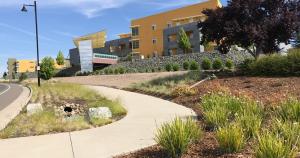 Jesus made Peter breakfast and an apostle was reborn. Plato found Socrates and philosophy keeps responding to that relationship. A great good, perhaps the greatest good, of college education is finding a mentor: the older person who does not only teach the craft you need, but the character you lack.
Jesus made Peter breakfast and an apostle was reborn. Plato found Socrates and philosophy keeps responding to that relationship. A great good, perhaps the greatest good, of college education is finding a mentor: the older person who does not only teach the craft you need, but the character you lack.
This cannot be manufactured or commanded. The time, quiet, and space needed is expensive and hard to find. The just demands of life, earning a living, squeeze the time, fill the quiet with noise, and build up more practical creations in the space. Older men and women are kept too busy to have the time to sit cooking fish over a fair by Galilee or sitting under the trees listening to the cicadas.
This can, of course, turn into guruism, the time wasting truism spouted by sophists. Yet this imitation is the tribute credentialism pays to true education. Literature demonstrates, film shows, that leaders, heroes we need, are made when they find a true sage. Luke needs more time with Obi-Wan, Ray a better Luke.
This much is true, but there is a deeper need. A student needs to consent to Wisdom, to love Wisdom, in order to change. You cannot keep Frederick Douglass from learning, even if society keeps books and mentors from him. You cannot teach some of us, eager for fresh entertainment, but no challenge to our ideas, anything old or new. We may value knowledge, a stack of facts, but not wisdom.
Wisdom will grant virtue and virtue empower knowledge to do good. Wisdom never merely sits and thinks, but instead sits and thinks on day to get up the next day to create a business, beauty, or
Laches is a Platonic dialog dealing with courage, but mostly truly (as many dialogs are) about education. Older men wish to educate younger men and think they can pay a flashy performer to show courage to their sons. They have made a dubious choice for an example. The stage warrior is clownish in actual battle: an ancient version of the Hollywood hero. As the conversation continues a deeper lesson emerges.
The young men, the future students, are not there. Education is being proposed for them, but no relationship is being established. Socrates, someday to be one of the greatest mentors, is there, but talking to men who wish other men to be educated. The students are missing. As adults they cannot consent to the course of study being developed. Dad may pay for some program, hire some sophist, to make a proper Athenian out of his boy, but the basic relationship is not there, because the sons have not been asked if they wish to love wisdom. The students are missing and so the educational program falls into the an archaic mumble about what the “young people” might need.
The time to reflect will not exist: the fathers are eager to spend cash to fill a schedule. The proper space will not be made, because the fathers are in a hurry. The parents are right, absolutely correct, to wish virtue for their children and courage. They are right to reject any false education that would make their children impotent, unable to create what the city needs.
These fathers know to reject one kind of dilettante, the lotus eating sophist, but are overwhelmed by another sort: the false man of action. This is the parent who sends his children to learn business from a man with credentials to talk about business, but who has never built or run one. The deeper problem, God help us, is that the value virtue (in this case courage), but do not value finding a mentor that can help cultivate that expression of wisdom in their children.
The students and the teachers are missing and the dialogue ends in failure. This is the fate of most “educational reform.” God helps us to do better. May our colleges provide a place for servants of Jesus to make breakfast and discuss the soul. May our institutions give Socrates a tree under which he and some students can sit.
—————————
I am thankful for a week in the splendid beauty of the William Jessup University campus led by President John Jackson. The chance to read and reflect on Laches was most good in a place where real education is sought and leadership is sound.













